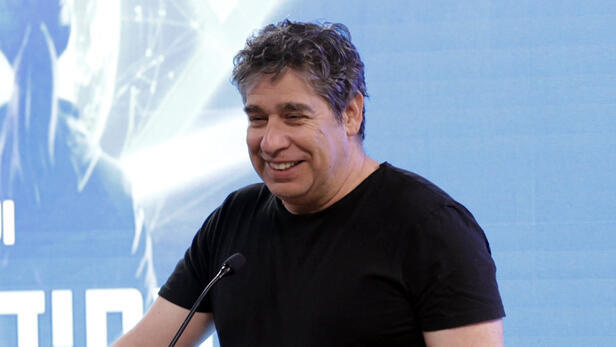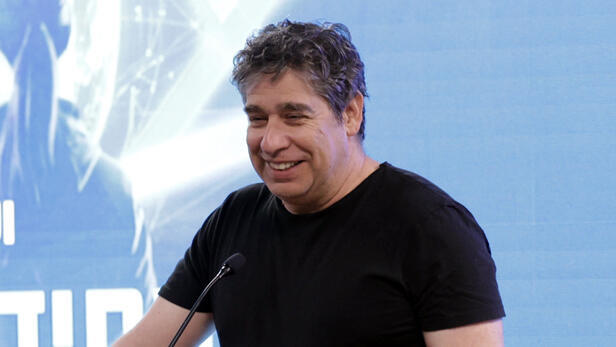
Palo Alto Networks founder Nir Zuk: “We can’t keep relying on cyber as the engine of Israeli high-tech”
Outdated curriculums threaten the nation’s high-tech edge, says cybersecurity pioneer.
“The education system in Israel is nothing special, to say the least,” said Nir Zuk, founder of Palo Alto Networks, at the Future Generation Technology Conference hosted by the BeNetivei Udi organization. “Certainly compared to the United States, where I lived for 23 years. On the other hand, when you look at the outcomes—such as the number of startup founders per capita—Israel performs much better. Most of the developers at our company, and in other Silicon Valley companies, are foreigners, including Israelis. So even though the U.S. invests more in education, fewer entrepreneurs and high-tech professionals are emerging. The question is: why?
“The money comes in, but not from the state. Families in the center of the country, whose parents have financial means, invest in private education and extracurricular classes. I was born in Rehovot 54 years ago, when it was still considered the periphery, and I was lucky to attend classes at the Weizmann Institute and later study computers at ORT. That’s how I got to where I am. It’s fortunate that organizations invest in children from the periphery—but this should be the state’s responsibility.
“The education budget for 2025 is 90 billion shekels. That’s a million shekels per year for a classroom of 40 students, and yet I don’t know where the money goes. There’s enough funding to deliver a much better education. It shouldn’t rely on charities, donations, or parents' pockets. Today, there aren’t enough high-tech graduates, and almost all of them come from elite military tech units. High-tech is forced to rely on that alone. But we also need non-military tracks, and there’s no national strategy for how to build them. We need to find a systemic solution.”
Zuk added that it’s no longer possible to teach students today what was taught 40 years ago. “But that’s more or less what’s still happening. The Ministry of Education tried to introduce AI studies in schools, but in practice, they’re just teaching kids to use ChatGPT, generate images, and write essays with it. Instead of fostering creativity, they’re stifling it. We need a curriculum aligned with the future needs of Israeli high-tech and the State of Israel. These students need to be prepared for the next 20 years.
“We can’t keep relying on cyber as the engine of Israeli high-tech—and therefore the economy. The cyber market is undergoing a major consolidation, partly thanks to the company I founded. The number of vendors is shrinking, and the remaining ones are growing larger. We're moving toward a world with just a few big cyber players. In such a market, there’s less room for startups. That’s why we need to guide young people in school and in the army to look beyond cyber. High-tech needs more than that.”
Related articles:
Zuk also spoke about other sectors, including fintech, defense tech, and medical technology. “In medtech, Israel has relative advantages and tremendous opportunities, but we must prepare the younger generation accordingly—and I don’t see that happening. There aren’t enough companies in these fields. We need to ask what the education system and the army are doing to train young people for these industries. We can’t keep placing the burden on nonprofit organizations. The public education system has the resources. The question is who can utilize them—and how to channel them to students. Israeli high-tech is amazing. We just need to scale it. Imagine what we could achieve if the resources actually reached the right places.”
On artificial intelligence, Zuk said: “This field is advancing, and many people fear it will replace them. I don’t think that’s the case. The AI we see today will help people work more efficiently. We might work less, but achieve more. That’s why we must start teaching AI in schools. AI is about applications! That’s where Israel needs to invest—not in infrastructure, but in teaching people how to build AI-powered applications. That could be Israel’s competitive edge. We can’t beat other countries in infrastructure, but we can build better applications.”
In conclusion, Zuk emphasized the need for long-term, systemic thinking. “We need to rethink what children in Israel learn from grades 1 through 12, what’s taught in university computer science and engineering departments, what’s done in the army, and how all of that prepares young people for high-tech. We have the talent, the culture, and we’re already producing the most entrepreneurs per capita with relatively limited resources. We have the army as an educator too—we just need to use it more effectively. High-tech could be in a much better position if we invest in it properly.”
